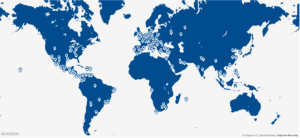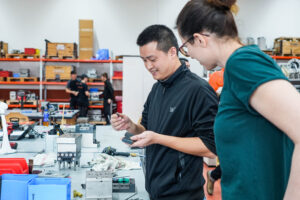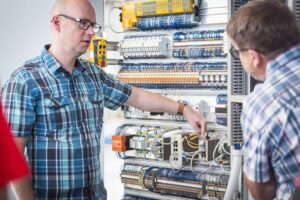Most of the foreign locations of Vorarlberg companies are operated by ALPLA, with 188 sites in total. In 1968, the plastics specialist took over a plastics plant in Venezuela by chance, rapidly expanding first into South America, then North America. ALPLA now has branches in 47 countries on four continents. One of the newest plants was established last year in Morocco. In the Tanger plant, besides preforms which are blown into PET bottles for the beverage industry, plastic pallets are molded, and packaging films are extruded. Currently, 32 employees work at this location.

Globally, 23,300 people call ALPLA their employer. The working philosophy of ALPLA founder Alwin Lehner and his Family of Pioneers is implemented in all branches, and even the Vorarlberg apprenticeship training is internationally promoted. In Mexico, China, India, Romania, Poland, South Africa, and Germany, trainees can complete an apprenticeship modeled after the Vorarlberg system.
150 Years of Experience
The earliest foreign branches of a Vorarlberg company were likely founded by Ferdinand Weiss around 1875 in the Mediterranean (Trieste, Venice, and Genoa) and Switzerland. Today, Gebrüder Weiss, a full-service logistics provider, has 180 company-owned locations. The culture of each national organization is a blend of local culture and the Lauterach company culture. The familial character of the “orange family,” consisting of around 8,400 employees, is very important even in the global structure. This is achieved through personal relationships between locations, teams, and colleagues. Each new branch is integrated into the company network with targeted measures (myOrange-College, GW App, training, onboarding).
Global Connections, Local Strengths
Personal relationships across borders are also notably important to the automation specialist Bachmann electronic from Feldkirch. It is quite common for colleagues from the USA, Denmark, and China locations to attend the Christmas Party or Summer Fest. Many of the approximately 550 employees from foreign plants are personally familiar with the headquarters. Last year, technicians from Korea, where the newest Bachmann branch is located, were trained in Feldkirch for their tasks.
The Korean city of Busan is the world’s shipbuilding capital, which is very important for the company’s maritime solutions. Bachmann electronic automates ship drives and port facilities, among other things. The location in Rendsburg, Germany, is strategically placed just 50 kilometers from both the North Sea and the Baltic Sea. Here, the company strategically bundles its expertise in automation solutions for wind energy.
Competence and Cultural Exchange
The company Getzner Werkstoffe also uses its branches in seven countries on five continents as competence clusters. The production site for the Isotop series, polyurethane-metal combinations, is located near Stuttgart. Isotop vibration dampers are used as machine mounts and minimize vibrations and noise. Local colleagues are regularly sent to exchange with this and other branches. They carry technical expertise, company spirit, and Vorarlberg mentality; for Asian locations, they also bring chocolate from the Milka store at the Bludenz Mondelez plant, for German colleagues Vorarlberg mountain cheese and Subira schnapps.
As part of the company’s internal onboarding program and for specialized training, foreign employees are invited to Bürs. These visits are often utilized for extensive programs that introduce Vorarlberg culture and philosophy, such as visiting hydroelectric plants for green energy, hiking, or enjoying Kässpätzle. The modern headquarters of Getzner Werkstoffe in the mountains always impresses international colleagues.
Wallenmahd to Shanghai
The fact that industry and agriculture exist side by side in Vorarlberg surprises foreign Blum employees. A 14-member delegation from China was greeted by the mooing of a cow from the opposite field upon arriving at the Dornbirn plant in 2023. Many of the Chinese technicians, incredibly, had “never seen cows before,” according to their own statements. Traditions like lighting a large bonfire in the middle of a village (Funken) or carnival parades (Fasching) also surprise them. The teams from Shanghai were trained in Vorarlberg for two weeks on the systems they later operate in their plant. These key workers then train their colleagues in China.

Blum produces in Vorarlberg for the European market, in North Carolina for the North American market, in Brazil for the South American market, and with the new plant opened in Shanghai in 2022 for the Asian market. The plant on the east coast of the USA, established in the 1980s, has been offering apprenticeship training for over 20 years, and the assembly plant in Poland also trains young professionals under a similar model.
International Training Center
To train customers and employees, Doppelmayr even established a dedicated Ropeway Training Center in Dornbirn four years ago. Various ropeway components and complete ropeway controls are available for training on 1,000 square meters in the Bildgasse. Around 400 ropeway employees from all over the world practice dealing with ropeways annually, such as maintaining clamps or simulating troubleshooting in the control system.

The Doppelmayr Group has built over 15,600 ropeways worldwide. Regardless of the country where the installation ultimately stands, the know-how and high-tech components for the popular circulating ropeways always come from the experts in Wolfurt.
It is impressive where Vorarlberg companies have left their mark worldwide: whether it’s the expertise of a mechanical technician repairing a hinge deformation system in Shanghai or the technology for producing a PET preform for a Coca-Cola bottle in Tangier, Morocco. Around 34,000 people work at 397 locations for these six companies outside Vorarlberg alone.
Text by Manuela de Pretis, WISTO for the June Edition of the Business Magazine Thema Vorarlberg (Read online at themavorarlberg.at)
Photos (c) Julius Blum GmbH and Doppelmayr Seilbahnen GmbH